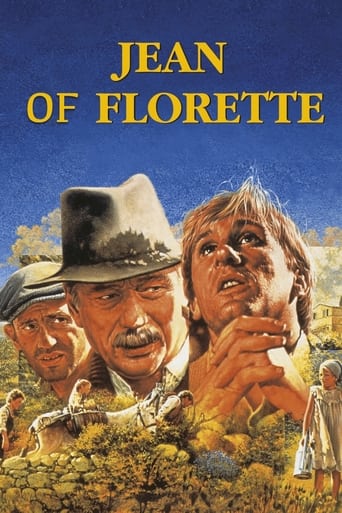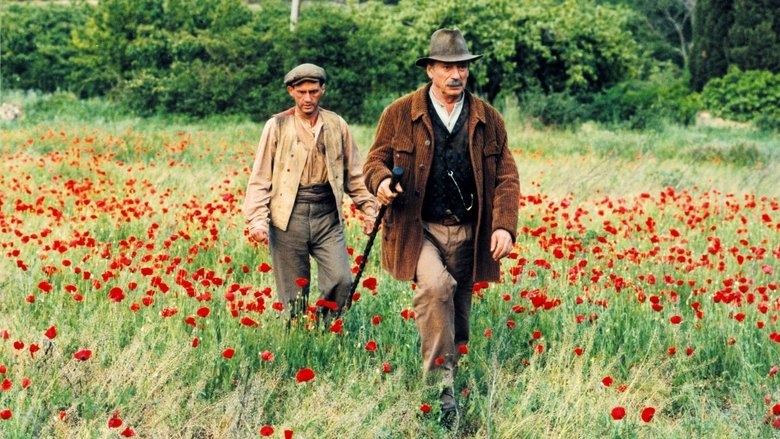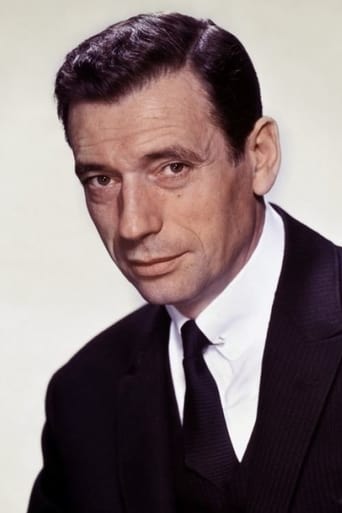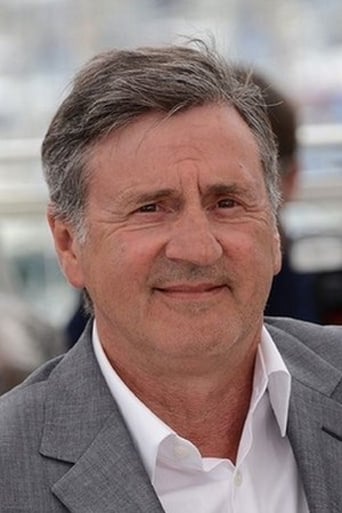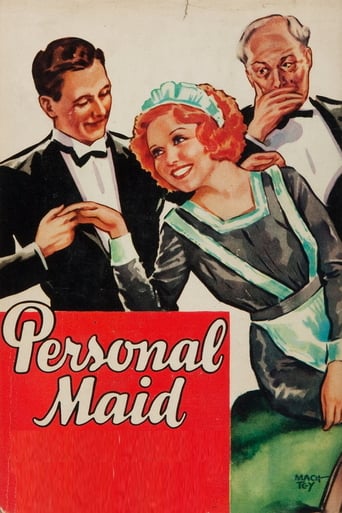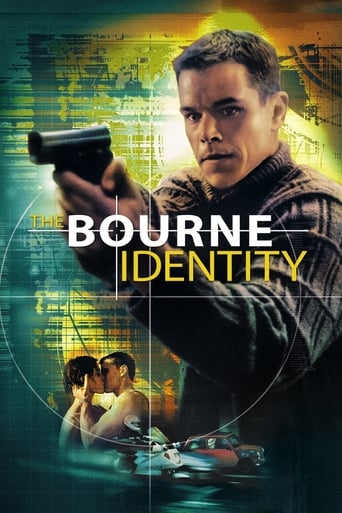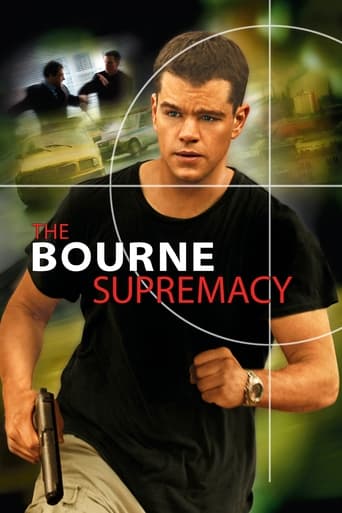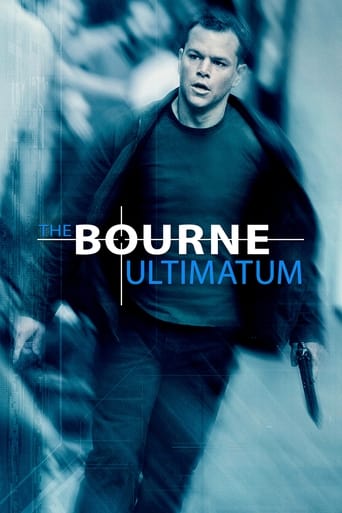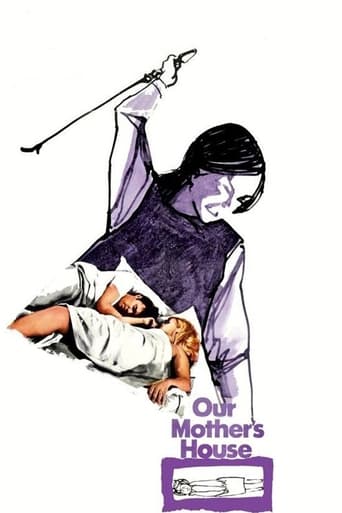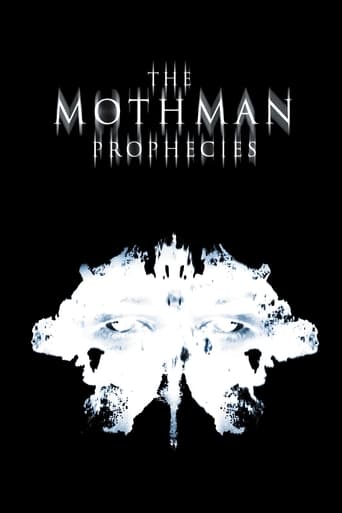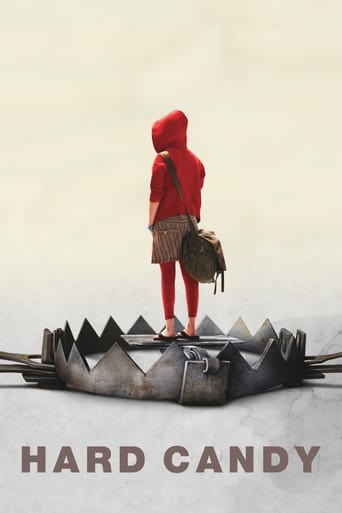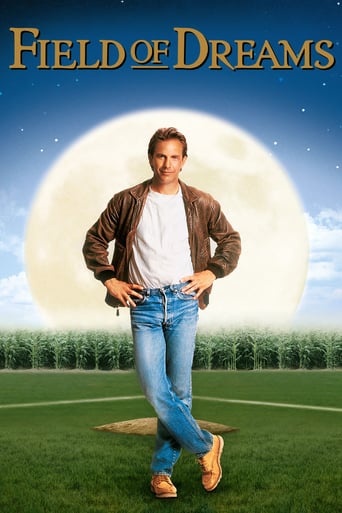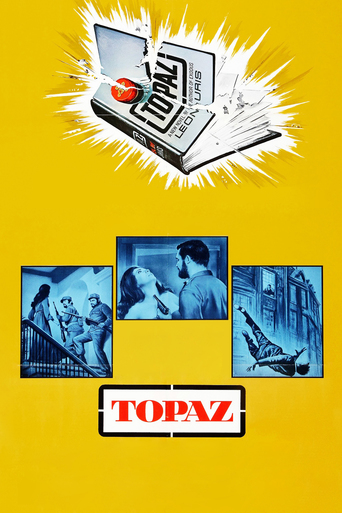Jean de Florette (1987)
In a rural French village, an old man and his only remaining relative cast their covetous eyes on an adjoining vacant property. They need its spring water for growing their flowers, and are dismayed to hear that the man who has inherited it is moving in. They block up the spring and watch as their new neighbour tries to keep his crops watered from wells far afield through the hot summer. Though they see his desperate efforts are breaking his health and his wife and daughter's hearts, they think only of getting the water.
Watch Trailer
Free Trial Channels
Cast


Similar titles
Reviews
In other words,this film is a surreal ride.
It is both painfully honest and laugh-out-loud funny at the same time.
The biggest problem with this movie is it’s a little better than you think it might be, which somehow makes it worse. As in, it takes itself a bit too seriously, which makes most of the movie feel kind of dull.
While it doesn't offer any answers, it both thrills and makes you think.
Jean de Florette and Manon of the Spring are more closely related than an original and sequel; they are really parts 1 and 2 of the same film, and in fact were filmed back to back.Set in Provence around 1920 (most people still use horses, donkeys and mules, but there are a few autos around; telephones exist but are rare, the mayor is very proud to have one), the first film tells of Jean de Florette (Gerard Depardieu,) a rather intellectual bourgeois civil servant from the city who, having inherited a farm in Provence, moves his wife Aimee (Élisabeth Depardieu, Gerard Depardieu 's real life wife at the time) and ten year old daughter Manon there, with the intention of applying scientific principles to raise vegetables and rabbits. But in the arid climate of Provence, everything depends on water: there is a plentiful spring on the property but Jean doesn't know it because his neighbors, local worthy Cesar "Le Papet" ("Gramps") Soubeyran (Yves Montand) and his rather dim nephew Ugolin (Daniel Auteuil) have blocked it up, hoping that the lack of water will cause the farm to fail, so they can buy it cheap. This tactic has tragic consequences for Jean's family. The second film recounts how ten years later Manon, now a beautiful young woman, finds both the spring and a way of revenge for what was done to her family. In the end, everyone gets more or less their just desserts.The films have an interesting history. French writer and director Marcel Pagnol, whose play Marius was latter turned into the French film trilogy Marius/César/Fanny, which was itself remade into the 1962 Hollywood film Fanny with Leslie Caron and other big stars, made a film in 1953, Manon des Sources, telling the second part of the story; his final cut of over four hours was so drastically cut by the distributor that Pagnol disowned it, and later redid the same story as a novel, adding a prequel novel, Jean de Florette; these two books together became the basis for these films.Jean de Florette and Manon of the Spring were a huge success both commercially and critically, and it's easy to see why. The Provencal settings are meticulously detailed and the landscape photography luscious. The acting is all around excellent: Gerard Depardieu and Yves Montand especially are as good as they've ever been.These films are not perfect works of art: they are not free of sentimentality, some viewers may occasionally be confused about exactly who some of the minor characters are, and the surprise ending ties together all the loose ends so neatly that it may see rather artificial. But these are minor flaws. All in all, this is a production that I think everyone will like: it's one of those rare films that leave you with memories that seem to be of people and places you've experienced rather than seen on a screen.
Weak-minded Ugolin Soubeyran (Daniel Auteuil) returns to his uncle Cesar 'Le Papet' Soubeyran (Yves Montand) after his military service. Ugolin has a plan to grow carnations. With his greedy uncle, they go to their neighbor to buy his land. However the uncle gets into a fight and kills the owner. The death is assumed to be an accident. Le Papet directs Ugolin to block up a natural spring on the property and destroy the place so the new owner would sell it cheap. Hunchback Jean de Florette (Gérard Depardieu) from the city inherits the property. He brings his family with big plans to spend his inheritance to build a rabbit farm. Ugolin pretends to be his best friend while they sabotage Jean's operation. At first, Jean's hard work and book smarts make the place successful. However a dry summer makes it impossible to farm without water.This is a movie of great ups and downs. I was leery of the movie in the first half as the villains keep getting away with their evil deeds. The little temporary reversal of fortune is the key to the drama. It builds up the hopes of the audience so that the fall could be even greater. The three main actors are terrific. The cinematography is beautiful.
A greedy landowner and his backward nephew conspire to block the only water source for an adjoining property in order to bankrupt the owner and force him to sell.Roger Ebert commented on Berri's exploration of human character, "the feeling that the land is so important the human spirit can be sacrificed to it". Is human character in this sense shaped by the land? Of course. Is it always? Maybe not."Jean de Florette" and "Manon des Sources" have been interpreted as part of a wider trend in the 1980s of so-called 'heritage cinema': period pieces and costume dramas that celebrated the history, culture and landscape of France. And good on them for that.
I have many favorites, and this is one of the crème de la crème. This is a visually stunning film more like beautiful photographic montage. It is simple, tragic story well told, unlike many of today's plots - implausibly lame, suffering on a CGI crutch for 85 minutes. The simple story is about enduring truths which have been the mainstay of the Greek classics and Shakespeare: Our human strengths, our failings, our virtues, and our vices. The story may be a fiction, but its kernel is not. It is stories and story telling like this which has kept our rapt attention for four thousand years.First we should understand that this film is only the first half the novel by Marcel Pagnol which would have been too long as a single film, and out of necessity, was shot as two. The second half is titled, Manon of the Spring. Neither film stands alone as satisfactory because, obviously, it would be incomplete, and naturally, is also important that the two halves be viewed in sequence. For a fairly dispassionate précis of the plots, I suggest reading the ones on Wikipedia, so I won't be repetitive here. I also recommend reading the boards for comments and discussions.JdF & MotS were both shot at the same time in 1986 with a budget of $17 million making it/them the biggest budget French films up to that time. JdF grossed $86M worldwide, and of that sum, only $4.9M was from the USA. MotS grossed $56M worldwide, of which only $3.9M was from the USA. In other words, culture films are not a good fit for the American viewing audience, and the gross revenue numbers bear this out. The rest of the world seems to bear out this conclusion.Foreign language films rarely do well in the USA for the simple reason that the vast majority of the viewing audience are unilingual anglophones who do not wish to burden themselves with having to work at "understanding" their entertainment - they wish to merely consume it. If it requires the work of reading subtitles or thought, it becomes unpalatable. This film requires your attention and thought!But to be fair to the US viewers, the subtitles are at times incomplete or inaccurate, and unlike the spoken word, they do not convey the emphasis or importance of certain bits of dialogue well. The plot is woven steadily throughout the film, so the viewers with no understanding at all of the French language are missing essential dialogue, and therefore plot.The bottom line is this: You will either be entranced by these two films and love them, or you will be bored by the first 15 minutes, and you'll translate that into "bad film." If your highest quality level of reading is Marvel comics then I suggest you stay away from this one.However, I recall years ago walking into a video store where this was playing on all the monitors. All the patrons in the store, ranging in age from 5 to 75 years, were standing transfixed watching this film. There was something magical about it!

